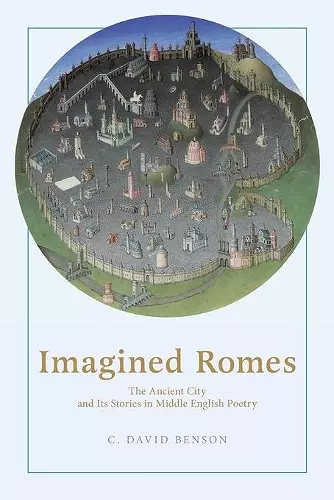Imagined Romes
The Ancient City and Its Stories in Middle English Poetry
Format:Paperback
Publisher:Pennsylvania State University Press
Published:20th Aug '20
Should be back in stock very soon
This paperback is available in another edition too:
- Hardback£80.95(9780271083209)

This volume explores the conflicting representations of ancient Rome—one of the most important European cities in the medieval imagination—in late Middle English poetry.
Once the capital of a great pagan empire whose ruined monuments still inspired awe in the Middle Ages, Rome, the seat of the pope, became a site of Christian pilgrimage owing to the fame of its early martyrs, whose relics sanctified the city and whose help was sought by pilgrims to their shrines. C. David Benson analyzes the variety of ways that Rome and its citizens, both pre-Christian and Christian, are presented in a range of Middle English poems, from lesser-known, anonymous works to the poetry of Gower, Chaucer, Langland, and Lydgate. Benson discusses how these poets conceive of ancient Rome and its citizens—especially the women of Rome—as well as why this matters to their works.
An insightful and innovative study, Imagined Romes addresses a crucial lacuna in the scholarship of Rome in the medieval imaginary and provides fresh perspectives on the work of four of the most prominent Middle English poets.
“As with [the author’s] book about medieval Troy stories, Imagined Romes may well become a standard undergraduate source. The book conveniently maps out a set of instances in which some medieval writers represented Rome or responded to various definitions of Romanness.”
—Sylvia Federico Speculum
“The relation of medieval cultures to Rome is creatively conflicted: early Christianity defines itself against everything that ‘Rome’ stands for, while the Papacy models itself as a new empire. David Benson’s Imagined Romes takes us into the medieval city and trains us to understand how late medieval English readers of and visitors to the eternal city imagined its republican and imperial past. The resultant book—ever lucid and engaging—is full of illuminating surprises.”
—James Simpson, author of Under the Hammer: Iconoclasm in the Anglo-American Tradition
“David Benson has written a book that was much needed not only by students of medieval English literature but by all those who are interested in pagan and Christian Rome and her image after the fall of the empire. Imagined Romes is a work of intelligence and love, full of the surprises that only a great scholar can set up and rewarding throughout.”
—Piero Boitani, author of The Gospel According to Shakespeare
“Benson’s lyrical book about English writers’ recovery of ancient Rome allows us to see how profoundly ideas about Rome shaped the later Middle Ages. Imagined Romes offers a delightful tour of an ancient city that existed only in the memories of Middle English poets. Despite being a fantasy, this Rome shaped conceptions of power, truth, justice, mercy, love, tragedy, and literature for generations. Benson’s book will appeal to literary scholars, medievalists, and any reader who has fallen in love with a place found only in a book.”
—Rebecca Krug, author of Reading Families: Women's Literate Practice in Late Medieval England
“The originality and critical acumen of this work are well represented in its title: the reader can expect to discover a multitude of Romes, as Benson highlights the plurality of cities that, under the name of Rome, were built in the imagination of Middle English poets.”
—Giulia Boitani Medium Aevum
“Imagined Romes resounds with evocative and theologically rich tales of Rome and Romans in Middle English poetry, and will captivate a contemporary literate audience with the marvels of the eternal city, in an analogous fashion to those wondrous bells ringing-out from the Capitoline hill.”
—Sean Michael Ryan Reading Religion
“This study ably fills a startling gap that I, for one, had not previously thought to consider. The interpretative consequences are estimable, for Benson’s focus through the lens of Rome eloquently illuminates significant aspects of all four Middle English poets he considers.”
—Karla Taylor Studies in the Age of Chaucer
ISBN: 9780271083216
Dimensions: 229mm x 152mm x 15mm
Weight: 376g
216 pages